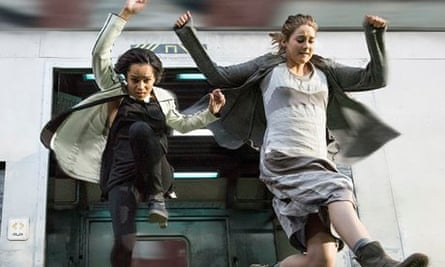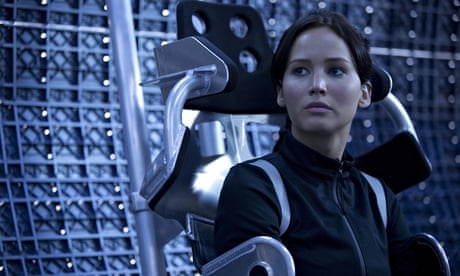A "progressive parent" friend of mine was recently expressing enthusiasm over the fact that his children had taken to reading Young Adult dystopian novels. They were dying to see the new feature film adaptation of the book The Giver (see Sarah Palin's review, here), after having ploughed through the quartet of bestselling books by Lois Lowry. They had absorbed the blockbuster film adaptations of Divergent and The Hunger Games and had hungrily consumed the associated merchandise . They'd also made hundreds of new friends from all over the world who "shared" the same passion for dystopian teen icons Katniss, Tris and Jonas through the tens of thousands of Twitter fan accounts.
My friend thought teenage dystopian fiction to be a great improvement on the Harry Potter cult that had been filling children's heads with right-wing dreams of public schools and supernatural powers. He felt that YA dystopias were a good way of teaching kids to "question authority" - these books, after all, had protagonists who exposed the lies of their societies, they were standing up against those in power. Dystopian YA was, he claimed, a great left-wing educational tool. My friend could not have been more wrong.
Twenty years ago he would have been right. He was projecting from his fond memories of the dystopian novels and films of his own childhood, from the free-market-will-bring-hell-on earth period of speculative fiction. This was a tradition which sprang from HG Wells and his engagement with communism (see his discussion with Stalin from 1937) and which filtered into the 1960s through left-engaged authors like Philip K Dick. Dick's Do Androids Dream of Electric Sheep (adapted for screen as Blade Runner) saw a post-apocalyptic world in which a massive private global corporation had replaced governments and nations.
A similar picture of dictatorship - albeit a Christian fundamentalist anti-feminist one - formed the oppressive dystopia in Margaret Atwood's The Handmaid's Tale, while second wave feminist scholars read the cyberpunk movement in fiction through an anti-patriarchal, anti-capitalist lens. The science fiction of William Gibson was also championed by the Marxist critic Fredric Jameson. In this period the capitalist dystopia was a respected left wing "cultural strategy" and its dominance endured till around 1993 which, coincidentally or not, was the time of the fall of the old left and the rise of neoliberalism. The dystopian narratives which are currently consuming the minds of millions of teens worldwide are now communicating right-wing ideas.
You might say, wait, they're all about freedom and truth and oppressive societies, but the kind of freedom that's being advocated in The Hunger Games and Divergent is, as Salon magazine recently pointed out, more like "agit-prop for capitalism".
What marks these dystopias out from previous ones is that, almost without exception, the bad guys are not the corporations but the state and those well-meaning liberal leftists who want to make the world a better place. Books such as The Giver, Divergent and the Hunger Games trilogy are, whether intentionally or not, substantial attacks on many of the foundational projects and aims of the left: big government, the welfare state, progress, social planning and equality. They support one of the key ideologies that the left has been battling against for a century: the idea that human nature, rather than nurture, determines how we act and live. These books propose a laissez-faire existence, with heroic individuals who are guided by the innate forces of human nature against evil social planners.
Of course, there is not some secret underground bunker filled with a Bilderberg-group-type-fraternity of neoliberals & neocons dictating what Young Adult authors write and neither is there a conspiracy among right-wing media moguls to implant reactionary messages through the mass media into the minds of the young and impressionable. This is one of those zeitgeist moments where the subconscious of a culture emerges into visibility. We might be giving ourselves right-wing messages because, whether or not we realise it, we have come to accept them as incontestable. This generation of YA dystopian novels is really our neoliberal society dreaming its last nightmares about the threat from communism, socialism and the planned society. We've simplified it to make it a story we can tell to children and in so doing we've calmed the child inside us.
Common to the two trilogies and one quartet above is the same underlying narrative: In each a unique individual who lives in a stable, peaceful, carefully structured society is graced or cursed with extraordinary skills which mark them out from the conformist communities around them. In The Giver this is the psychic power of memory, in Divergent it is genetic divergence from the five factions which make up society and in The Hunger Games it is survival cunning. These unique individuals are then forced to make a choice which places them in conflict with the powers that be. Through this friction the powers are exposed as an all-controlling government that dictates, enforces and polices all social norms and behaviours and which has laid down a rigid structure for the society and the economy through which it operates. As a line from the elite who rule society in The Giver states: "When people have the power to choose, they choose wrong."

Yes there is a critique of statism at the heart of these books, but you might say, big deal: every teenager is a rampant individualist, a libertarian. However, the right wing root runs quite a bit deeper into the narrative structures.
In each of these narratives the all-controlling or totalitarian government (which sees itself as a utopian social engineer) has come about after a catastrophe. In Divergent/Insurgent/Allegiant the disaster occurred after specialists failed in their attempts to alter DNA for the better; in The Giver it is after unendurable exposure to human suffering that the specialists attempted to construct a perfectly-controlled society and in The Hunger Games it is after a period of mass death and destruction that the same totalising governmental structure is put in place by a well-meaning elite. As the leader in The Hunger Games: Mockingjay - Part 1 announces: "Since the dark days our society has known only peace, ours is an elegant system conceived to nourish and protect".
In the Giver, the evil social structure is something called 'Community' and the genetic nuclear family has been banished (this was once a long term plan of the communists). Men and women have total gender equality in the workplace and the job that the father of protagonist Jonas does is as a "nurturer" – he takes care of babies. (You might be able to see the Marxist feminist project here being traced as a burgeoning hell on earth). Children do not know their biological parents and are raised in their first years communally – a project originally envisaged by the communist Alexandra Kollontai.
Putting all this together within one genre, it's a huge indictment of the history of the left and a promotion of the right. Which is pretty cunning for a bunch of books for kids.
Not only that but this genre may, in terms of book sales, be the one of the largest markets in the history of publishing, so the message that left-wing utopians are inherently dangerous and potentially evil is hitting a lot of impressionable people. The quantity of books consumed here is staggering. The Hunger Games trilogy netted 36.5m copies, while The Hunger Games movie was the third biggest movie premiere of all time and Catching Fire broke box office records, while the Divergent trilogy held the top first, second and third places in the American bestseller list at the start of 2014 with 10m sales of the first book in the trilogy.
If you see yourself as a left-leaning progressive parent, you might want to exercise some of that oppressive parental control and limit your kids exposure to the "freedom" expressed in YA dystopian fiction. But let's not worry about it too much, the good thing about laissez-faire capitalism is that things come in waves and pass out of fashion quickly, and already people are saying that YA dystopia is dead..

Comments (…)
Sign in or create your Guardian account to join the discussion